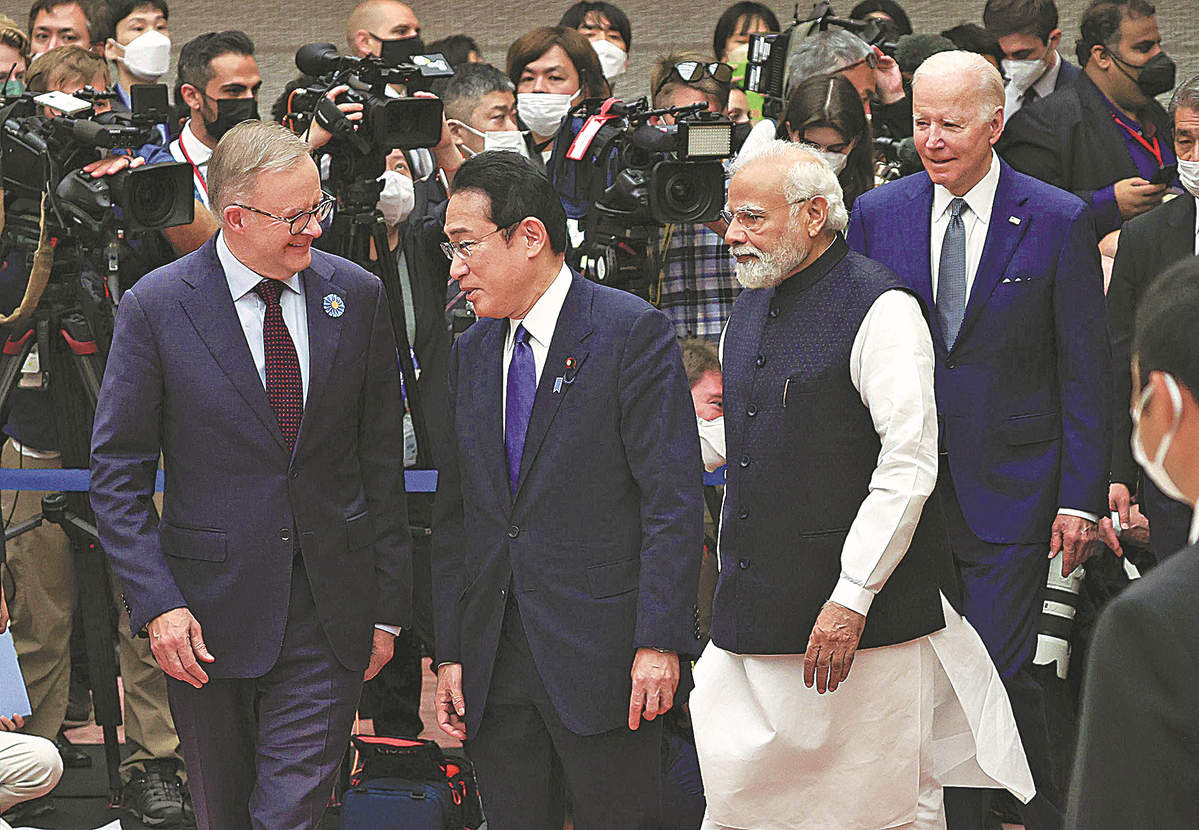Beijing slams Washington's word games
By WANG XU in Beijing and HENG WEILI in New York | CHINA DAILY | Updated: 2022-05-25 07:35

Expert questions US credibility on its commitment to one-China principle
The United States' strategic ambiguity became an issue on Tuesday as Beijing slammed Washington's propensity to play with words when US President Joe Biden walked back his remarks concerning Taiwan.
During a summit news briefing with Japanese Prime Minister Fumio Kishida in Tokyo on Monday, the US leader vowed to defend Taiwan militarily, suggesting a change in the decades-old US policy of strategic ambiguity over the island.
However, the White House quickly rolled back Biden's remark later that day, and Biden on Tuesday contradicted himself by saying, "The policy has not changed at all. I stated that when I made my statement yesterday."
Given that it has been the third time Biden made similar confusing comments on Taiwan, Foreign Ministry spokesman Wang Wenbin accused Washington on Tuesday of "making every effort to play with words on its commitment to the one-China principle".
The spokesman said that the US cannot stop the Chinese people from achieving complete national reunification with Taiwan, nor can it save the "Taiwan independence" separatist forces from failure.
"If the US goes further down the wrong path, it will invite irreversible consequences for the Sino-US relationship, and will ultimately make the US pay an unbearable price," Wang said.
"For our friends, we have fine wine. Jackals or wolves we welcome with shotguns," Wang quoted the final lines of a song written to eulogize China's war with the US on the Korean Peninsula in the 1950s as a warning. "Jackals" in the lyrics were a metaphor for the US soldiers fighting in the war.
The Taiwan question has been the most sensitive issue in China-US relations, with Washington intentionally using the "Taiwan card" in recent years to contain China. In its latest move, the US State Department removed its wording about not supporting "Taiwan independence" and acknowledging Beijing's position that Taiwan is a part of China from its website.
"That gives reason for the Chinese side to question the US' credibility on its commitment to the one-China principle," said Liu Qingbin, a former professor at the Institute of Advanced Sciences at Yokohama National University in Japan and now a senior researcher at the China Digital Economy Institute.
Liu said that the reason why the US has been fuzzy on whether it is willing to get involved militarily to defend Taiwan is twofold.
"It deters Beijing from taking the island province by force and it prevents authorities in Taiwan from seeking 'independence', which will provoke the Chinese mainland," Liu said.
However, Biden's repeated gaffes over the issue limited Washington's deterrence effort as many believe that "a gaffe in politics is when a politician says what he or she really means", Liu added.
Referring to Biden's comment, Douglas Paal, vice-president for studies at the Carnegie Endowment for International Peace, said, "I don't see this as helping keep the region calm and Taiwan safe."
Paal told China Daily: "I doubt this was well-coordinated. Otherwise, I don't know how it happened."
Sourabh Gupta, a senior fellow at the Washington-based Institute for China-America Studies, called Biden's remarks a "two-step play".
"Biden speaks off the cuff in a direct political manner understandable to laypersons that the US will defend Taiwan. And then the White House reins that comment in somewhat and restores the nuance to the US' one-China policy," Gupta told China Daily. "So, it seems like a two-step play. This happened last October, and I fully expect it to happen again in the future.
"I don't think this has to do with lack of policy management. The president seems determined to politically show strength, not weakness, on Taiwan policy, and leave it to his White House team thereafter to restore the equilibrium on the finer details of policy," Gupta said.
Yifan Xu in Washington contributed to this story.
























